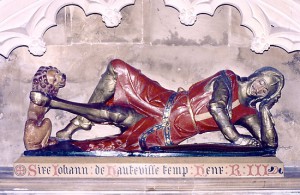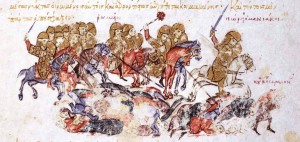 Tancred de Hauteville’s claim to fame is his remarkable fecundity. He produced at least twelve sons, three of whom (William Iron-Arm, Robert Guiscard, and Roger the Great Count) would achieve nearly legendary status and go on to found the richest kingdom of the medieval Mediterranean world. But what happened to the other nine?
Tancred de Hauteville’s claim to fame is his remarkable fecundity. He produced at least twelve sons, three of whom (William Iron-Arm, Robert Guiscard, and Roger the Great Count) would achieve nearly legendary status and go on to found the richest kingdom of the medieval Mediterranean world. But what happened to the other nine?
All but three of them eventually made their way to southern Italy. Since Tancred had two wives (Muriella and Fressenda), the family was effectively divided into two generations. Tancred’s first wife (Muriella) gave birth to five sons: Serlo, Geoffrey, William, Drogo, and Humphrey, while his second wife bore the next seven: Robert, Mauger, William (the younger), Aubrey, Humbert, Tancred, and Roger. The oldest boy Serlo (some sources call him the youngest) displayed the family penchant for fighting at an early age. After killing his neighbor over an insult, he was exiled for three years, but by 1041 had rehabilitated his image enough to inherit his father’s entire estate. This meant that the other boys had to seek elsewhere for their fortune, which started the exodus south.
Geoffrey left first with his half-brothers Mauger and William (the only two who seem to have gotten along with the older generation), and was present at the battle of Civitate where the Normans decisively defeated the Pope’s forces. All three of them were rewarded for their part in the struggle. Geoffrey was made Count of Apulia which he held until his death around 1071 (the same year his oldest full brother Robert Guiscard conquered Bari and evicted the Byzantines from Italy). His younger son Ralph crossed over to England with the Conqueror and was present at the Battle of Hastings. He would eventually settle in Wiltshire and found the English branch of the family.
Mauger got the old Byzantine Province of Foggia, but he didn’t enjoy it for long. He died shortly after a campaign against the Byzantines and his property went to the younger William who already ruled the Principality of Salerno. William proved quite successful- and by some accounts survived into the twelfth century- but his most important act was to invite his youngest brother Roger to Italy.
The most prestigious of the boys (after the Iron-Arm, Guiscard, and Great Count) were Drogo and Humphrey who both served as Count of Apulia and Calabria. Drogo inherited the position from William-Iron-Arm, and when he in turn was assassinated, Humphrey took up the mantle, triumphantly leading the Normans in the battle of Civitate. Humphrey did his best to contain the ambitions of his half-brother Guiscard, but when that proved impossible he entrusted his sons to him. In the best Norman tradition Guiscard promptly confiscated the inheritances and left the boys to fend for themselves.
The last two brothers- Aubrey and Tancred- seem to have stayed in Normandy, perhaps inheriting what was left of the family estate. As a fitting endnote, the oldest brother’s son (Serlo) made his fortune helping the youngest brother (his uncle Roger) conquer Sicily. Young Serlo fought notably for at least twelve years before he fell in an ambush. The place where he was killed- a large flat rock carved with a simple cross- was named after him for nearly nine centuries before a construction firm blew it up in the 1960’s.

Maniaces attacking the Arabs at Telouch
Like Athena bursting full grown from the brow of Zeus, George Maniaces- a giant ‘nearly ten feet tall with a voice like thunder’- first appears in the year 1030, aged 33.
Virtually nothing is known about his youth, but he was a wealthy land-owner in what is today modern Turkey, and was therefore probably educated in Constantinople. By 1030 he had risen to the rank of strategos or military governor of Telouch, a town just to the north of Aleppo. This was a relatively unimportant position since the province was the smallest on the Upper Euphrates, but it was a point of entry for Muslims raiding from Syria. In 1030 the Emperor Romanus III tried to put a stop to the raids, but was defeated near Telouch. The victorious Muslims claimed to have captured the Emperor and ordered Maniaces to surrender the city. He pretended to agree, sending them a generous portion of food and wine as a sign of his good intentions. But this was merely a ruse. He waited till the Muslims had indulged themselves, and then attacked when they were sleeping off the effects of the wine. All of the loot lost in the previous battle was recovered along with a sizable amount of Arab treasure (280 supply camels were captured). The ears and noses of the enemy dead were cut off and Maniaces immediately rode to the imperial camp where- in a brilliant PR move- he dumped the grisly trophies out in front of Romanus III.
He was promoted on the spot (as the new strategos of all the cities of the Euphrates), and began a grand offensive against the Muslim emirates of Syria. He quickly displayed the gifts which would make him famous. The major city of Edessa (modern Urfa) was attacked, and when it put up a stiff resistance, Maniaces bribed its governor into surrendering. A relieving Muslim army failed to evict him and three years later Maniaces was still able to send its annual tax of 50 pounds of gold to Romanus III.
While Maniaces was busy in the east, Italy was slipping out of the empire’s control. Sicilian Arabs invaded Calabria in 1032 and by 1037 managed to kill the imperial governor of Italy. Romanus III’s successor Michael IV ordered Maniaces to stabilize the situation and drive the Muslims from Sicily. Maniaces brought a formidable mercenary army which included the Viking hero Harald Hardrada and the Norman adventurer William Iron-Arm (whose brothers Guiscard and Roger would later conquer the island and found the Norman Kingdom of Sicily). He captured both Messina and Syracuse and was on the verge of restoring Sicily to Byzantium, but the temperamental aspects of his genius asserted themselves. He managed to offend most of his Lombard and Norman mercenaries by skimping on their share of the loot, and -far more seriously- he publicly humiliated his admiral who happened to be the brother-in-law of the most powerful member of the imperial court. In 1041 he was recalled on the charge of treason, but was saved by the death of the Emperor and the fact that all the gains in Sicily evaporated without him.
Unfortunately for Maniaces, he had powerful enemies. Though he was quickly sent back to Italy- and promoted to catepan (governor) of all Italy- the imperial court was now against him. This was mostly due an old rival- Romanus Sclerus- who owned several estates touching Maniaces’ property in Anatolia. There was no love lost between the two men (they had physically assaulted each other during a squabble over land) and Romanus was determined to undercut the general at every opportunity. While Maniaces was away, Romanus seduced his wife and then ransacked his house, making no attempt to conceal his actions. He then moved to the capital where he used his influence (his sister was the emperor’s mistress) to turn the court against Maniaces. The tactic worked. The emperor relieved Maniaces of command, and- in a move of stunning stupidity- chose Romanus Sclerus as the messenger to inform Maniaces of the development.
Any gleeful excitement Sclerus had at his triumph was short-lived. Maniaces reacted to the demand to turn over his forces by sealing Romanus’ eyes, ears, nose, and mouth shut with dung and then slowly torturing him to death. He then declared himself emperor and marched on Constantinople. In 1043 he reached Thessaloniki where he easily defeated the terrified imperial forces. Unfortunately for his adherents, however, the victory was a pyrrhic one. During the fighting he was struck with a chance blow and killed. With him died Byzantium’s ablest general and one of its most enigmatic figures- along with any chance for the empire to hold on to Italy.
 Tancred de Hauteville’s claim to fame is his remarkable fecundity. He produced at least twelve sons, three of whom (William Iron-Arm, Robert Guiscard, and Roger the Great Count) would achieve nearly legendary status and go on to found the richest kingdom of the medieval Mediterranean world. But what happened to the other nine?
Tancred de Hauteville’s claim to fame is his remarkable fecundity. He produced at least twelve sons, three of whom (William Iron-Arm, Robert Guiscard, and Roger the Great Count) would achieve nearly legendary status and go on to found the richest kingdom of the medieval Mediterranean world. But what happened to the other nine?